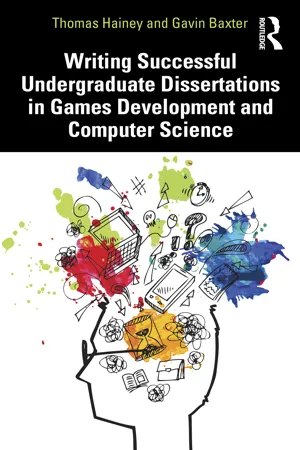
Writing Successful Undergraduate Dissertations in Games Development and Computer Science
Thomas Hainey, Gavin Baxter
- 294 pages
- English
- ePUB (mobile friendly)
- Available on iOS & Android
Writing Successful Undergraduate Dissertations in Games Development and Computer Science
Thomas Hainey, Gavin Baxter
About This Book
Writing a dissertation in the final year at university can be a highly daunting task for any student, but particularly if the degree is practically oriented and implementation based. This book provides an accessible, concise guide to producing a dissertation in computer science, software engineering, or games development degrees, with research projects typically involving design, implementation, testing, and evaluation.
Drawing on the authors' extensive knowledge and experience of supervising dissertation students, the book offers a step-by-step guide to the key areas of writing a dissertation alongside real-life examples. Chapters cover:
- Producing literature reviews.
- Formulating research questions.
- Understanding epistemologies.
- Selecting methodologies and research methods.
- Software development life cycle methodologies.
- Evaluation, statistical analysis, and formulating conclusions.
Working methodically through the different stages of writing a dissertation, this is an essential comprehensive guide for all students producing any form of dissertation in computer science, software engineering, or games development.
Frequently asked questions
Information
Table of contents
- Cover
- Half Title
- Title Page
- Copyright Page
- Contents
- Acknowledgements
- How to Use This Book
- 1 Introduction to Dissertations
- 2 Academic Rigour
- 3 Citations, Referencing, and Hierarchy of Academic Sources
- 4 Research Ethics
- 5 Dissertation Structure in Games Development and Computer Science
- 6 Research Methodologies and Methods
- 7 Formulating Research Questions
- 8 Performing a Literature Review
- 9 Selecting a Software or Games Development Life Cycle Methodology
- 10 Selecting a Software Design Modelling Language (SDML)
- 11 Design
- 12 Implementation
- 13 Testing
- 14 Evaluation
- 15 Statistical Analysis Techniques
- 16 Discussion
- 17 Conclusions
- 18 References
- 19 Appendices
- 20 Writing Up and Proofreading
- 21 Data Collection Mechanisms
- 22 General Questionnaire Design
- 23 Basic Intervention Experimental Design
- 24 General Academic Writing Tips
- 25 Presenting Research
- 26 Defending Research
- 27 Summary
- Index